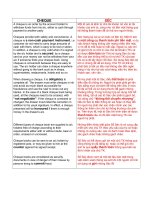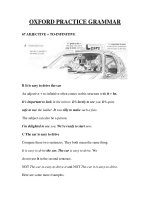Tài liệu Credit cards (Reading 13-50) pdf
Bạn đang xem bản rút gọn của tài liệu. Xem và tải ngay bản đầy đủ của tài liệu tại đây (52.73 KB, 1 trang )
Reading 13/50
Credit cards Thẻ tín dụng
Credit cards are a means of exchange, not a
payment. Ultimate payment by the card user occurs
at the end of the month when a cheques is written or
a bank a/c is debited to settle the outstanding
balance. In that respect, credit cards are akin to
trade credit for the users, and a substitute credit long
extended by retailers to customers. However, to the
seller of goods, sales made to the credit card users
have similarities to those made to cheque writers.
Costs and fee may differ, but credit card sales
vouchers can be effectively credited to the
merchant’s bank a/c in a similar manner to cheque
received. Because the voucher is a claim on the
credit card company or card issuing bank, the risk of
non payment is lower.
In the ways that most are currently structured, credit
card system can be thought of as similar to the
cheque payments system. Paper (i.e vouchers) flows
in a similar direction, the major difference being the
timing of transactions and liabilities incurred along
the way. The card holder/voucher writer is given
short-term credit (a short-term loan or long-term
float) by the card issuing body between the
immediate unconditional credit to the merchant
involved and delayed collection of value from card
holder. The combination of float to card holders
and more or less immediate reimbursement to stores
is thought to be one factor inhibiting the great use
of EFTPOS system, in which float is absent.
Thẻ tín dụng là một phương tiện trao đổi, không phải
một phương tiện thanh toán. Bước thanh toán cuối
cùng bởi người sử dụng thẻ xảy ra ở cuối tháng khi
một tờ séc được ký phát hoặc một tài khoản ngân
hàng được ghi nợ để tất toán số dư. Trong quá
trình này, thẻ tín dụng thường giao dịch ghi có với
người sử dụng, và để đổi lại mức tín dụng dài hạn từ
người bán lẻ cấp cho khách hàng của họ. Tuy nhiên,
việc mua hàng từ những người bán hàng cũng
tương tự như việc ký phát séc. Phí mua hàng và phí
có thể khác nhưng hoá đơn mua hàng bằng thẻ tín
dụng có chức năng ghi có vào tài khoản của người
bán hàng ở ngân hàng, cũng giống với việc nhận
Séc. Bởi vì hoá đơn chính là việc đòi tiền từ công ty
cung cấp thẻ tín dụng hoặc ngân hàng phát hành thẻ
tín dụng, rủi ro không thanh toán đã được giảm
thiểu.
Trong số hầu hết các cách thức hiện nay, hệ thống
xứ lý thẻ tín dụng có thể thông qua một hệ thống
giống thanh toán Séc. Chứng từ (ví dụ hoá đơn)
cũng luân chuyển theo hướng tương tự như vậy, sự
khác nhau chủ yếu là việc tính toán thời gian giao
dịch và các khoản nợ phải chịu. Chủ thẻ/ người viết
hoá đơn nhận được một mức tín dụng ngắn hạn
(một khoản cho vay ngắn hạn hoặc dài hạn không cố
định) thông qua chủ thể phát hành thẻ kèm theo các
điều kiện phi tín dụng tức thời đến người bán hàng
và cả đìều kiện thu tiền chậm từ chủ thẻ. Việc kết
hợp linh hoạt các điều kiện tín dụng với chủ thẻ và
việc tăng hoặc giảm số hàng hoá hoàn lại là một
trong các nhân tố ngăn chặn việc sử dụng hệ thống
EFTPOS (Cách 2: là một trong các nhân tố ngăn cản phát huy
ưu điểm của hệ thống EFTPOS), ở đó các điều khoản linh
hoạt không có.
(Không chắc lắm đoạn màu đỏ, vì ý của nó đọc ra thì
chả hiểu nó nói về cái j nữa )









